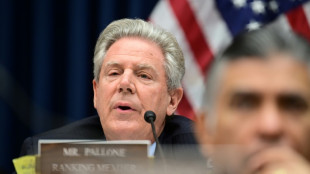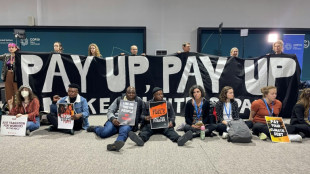
-
 US lawmaker accuses Azerbaijan in near 'assault' at COP29
US lawmaker accuses Azerbaijan in near 'assault' at COP29
-
Tuchel's England have 'tools' to win World Cup, says Carsley

-
 Federer hails 'historic' Nadal ahead of imminent retirement
Federer hails 'historic' Nadal ahead of imminent retirement
-
Ukraine vows no surrender, Kremlin issues nuke threat on 1,000th day of war

-
 Novo Nordisk's obesity drug Wegovy goes on sale in China
Novo Nordisk's obesity drug Wegovy goes on sale in China
-
Spain royals to visit flood epicentre after chaotic trip: media

-
 French farmers step up protests against EU-Mercosur deal
French farmers step up protests against EU-Mercosur deal
-
Rose says Europe Ryder Cup stars play 'for the badge' not money

-
 Negotiators seek to break COP29 impasse after G20 'marching orders'
Negotiators seek to break COP29 impasse after G20 'marching orders'
-
Burst dike leaves Filipino farmers under water

-
 Markets rally after US bounce as Nvidia comes into focus
Markets rally after US bounce as Nvidia comes into focus
-
Crisis-hit Thyssenkrupp books another hefty annual loss

-
 US envoy in Lebanon for talks on halting Israel-Hezbollah war
US envoy in Lebanon for talks on halting Israel-Hezbollah war
-
India to send 5,000 extra troops to quell Manipur unrest

-
 Sex, drugs and gritty reality on Prague's underworld tours
Sex, drugs and gritty reality on Prague's underworld tours
-
Farmers descend on London to overturn inheritance tax change

-
 Clippers upset Warriors, Lillard saves Bucks
Clippers upset Warriors, Lillard saves Bucks
-
Acquitted 'Hong Kong 47' defendant sees freedom as responsibility

-
 Floods strike thousands of houses in northern Philippines
Floods strike thousands of houses in northern Philippines
-
Illegal farm fires fuel Indian capital's smog misery

-
 SpaceX set for Starship's next flight, Trump expected to attend
SpaceX set for Starship's next flight, Trump expected to attend
-
Texans cruise as Cowboys crisis deepens

-
 Do the Donald! Trump dance takes US sport by storm
Do the Donald! Trump dance takes US sport by storm
-
Home hero Cameron Smith desperate for first win of 2024 at Australian PGA

-
 Team Trump assails Biden decision on missiles for Ukraine
Team Trump assails Biden decision on missiles for Ukraine
-
Hong Kong court jails 45 democracy campaigners on subversion charges

-
 Several children injured in car crash at central China school
Several children injured in car crash at central China school
-
Urban mosquito sparks malaria surge in East Africa

-
 Djibouti experiments with GM mosquito against malaria
Djibouti experiments with GM mosquito against malaria
-
Pulisic at the double as USA cruise past Jamaica

-
 Many children injured after car crashes at central China school: state media
Many children injured after car crashes at central China school: state media
-
Asian markets rally after US bounce as Nvidia comes into focus

-
 Tens of thousands march in New Zealand Maori rights protest
Tens of thousands march in New Zealand Maori rights protest
-
Five takeaways from the G20 summit in Rio

-
 China, Russia ministers discuss Korea tensions at G20: state media
China, Russia ministers discuss Korea tensions at G20: state media
-
Kohli form, opening woes dog India ahead of Australia Test series

-
 Parts of Great Barrier Reef suffer highest coral mortality on record
Parts of Great Barrier Reef suffer highest coral mortality on record
-
Defiant Lebanese harvest olives in the shadow of war

-
 Russian delegations visit Pyongyang as Ukraine war deepens ties
Russian delegations visit Pyongyang as Ukraine war deepens ties
-
S.Africa offers a lesson on how not to shut down a coal plant

-
 Italy beat Swiatek's Poland to reach BJK Cup final
Italy beat Swiatek's Poland to reach BJK Cup final
-
Japan, UK to hold regular economic security talks

-
 Divided G20 fails to agree on climate, Ukraine
Divided G20 fails to agree on climate, Ukraine
-
Can the Trump-Musk 'bromance' last?

-
 US to call for Google to sell Chrome browser: report
US to call for Google to sell Chrome browser: report
-
Macron hails 'good' US decision on Ukraine missiles

-
 Italy eliminate Swiatek's Poland to reach BJK Cup final
Italy eliminate Swiatek's Poland to reach BJK Cup final
-
Trump expected to attend next Starship rocket launch: reports

-
 Israeli strike on Beirut kills 5 as deadly rocket fire hits Israel
Israeli strike on Beirut kills 5 as deadly rocket fire hits Israel
-
Gvardiol steals in to ensure Croatia reach Nations League quarter-finals


'I won't stop talking': Ukrainians in China fight disinformation
Thousands of miles from a home consumed by conflict, a group of Ukrainians in China have found themselves on the frontlines of an information war, battling pro-Russia bias, trolls and censorship.
Around 300 volunteer Ukrainian translators, with some also based overseas, are relaying key events from Russia's war on their homeland into Chinese.
Their mouthpieces are a website called "Ukraine News", a Chinese edition of state news agency Ukrinform, and channels on messaging app WeChat and YouTube.
It is for the consumption of a Chinese audience otherwise fed a limited diet of broadly pro-Russian news on the invasion of Ukraine, in a country whose leaders are among Moscow's few remaining friends.
"We channel all our energy, anxiety and grief into doing something," Lidiia Zhgyr, a 29-year-old environmental educator from central Ukraine's Cherkasy, told AFP.
Russia's bloody invasion of Ukraine, now into its fifth week, has killed thousands and forced 10 million from their homes with more than 3.9 mn fleeing the country, according to the UN.
It has provoked widespread global outcry -- although not from Beijing, which has instead provided diplomatic backing for Russia.
During a phone call last week, US President Joe Biden warned his Chinese counterpart Xi Jinping of "consequences" for any material backing of Russia.
But Washington's attempts to isolate Moscow have so far failed to move Beijing's leadership.
And in the gap, Ukrainian volunteers are battling to change Chinese public opinion.
After the initial shock of war, Lidiia decided to help address what she describes as China's "information vacuum" on the conflict.
On a recent weekend in a hipster Beijing cafe, a small group gathered to discuss content for their Chinese-language YouTube channel, which gained over 1,000 subscribers in the week since it was launched -- despite needing a VPN to get over China's Great Firewall.
"The majority of people on Chinese social media support Russia," said Lidiia.
"But I also believe the majority of people don't have access to objective information."
They have set up another channel on messaging app WeChat to post videos of the conflict with Chinese subtitles.
Many videos are blocked by censors even though volunteers avoid posting graphic content, and the apps mostly used by the Ukrainian diaspora are inaccessible in China.
"The huge disadvantage for us is that there are no official news (outlets) from Ukraine in China," she added.
Meanwhile, Russian state media have several reporters based in China.
- Fight for truth -
Many Chinese media outlets have pushed Russian conspiracy theories about US-funded biolabs in Ukraine and blamed NATO for the crisis.
Equally, pro-Russia voices dominate China's highly controlled social media environment.
Valeriia Litovka, a tech worker based in Beijing, says it is "very hard" to share truthful information about the war in Ukraine.
"Still we fight for freedom, for the news, for truth," she told AFP.
"We don't want to offend other countries and Ukrainians respect the rules here... the goal is to give the message that people shouldn't be killed by someone else."
There have been small signs of a shift in Chinese state media coverage, with some recent reports acknowledging civilian casualties caused by Russian invaders.
The volunteers also say Chinese state media have quoted their translations of Ukrainian data on Russian military losses.
"At least one person told me they changed their opinion," said Lidiia.
The Kremlin denies targeting civilians.
- Guilt and resistance -
China's small Ukrainian expat community has dwindled to around a few thousand since the pandemic.
Some say they have received support from Chinese friends as their country has been devastated by war.
"We feel guilty that we are not there," said Valeriia, whose relatives are hiding in bomb shelters in the city of Kharkiv.
Others have had to block acquaintances expressing pro-Putin views on social media.
Ukrainian wine trader Eugene has given up convincing Chinese people online, but helps the cause in other ways.
"I posted several videos on WeChat but later decided to remove them," said Eugene, originally from western Ukraine, giving one name only for privacy reasons.
"I never imagined I would encounter this kind of opposition... it wasted too much energy."
While many pro-Ukraine viral posts and petitions have been censored, a few pockets of support remain -- including the two Weibo accounts operated by the Ukrainian Embassy in China.
Pro-Ukraine Weibo users have translated news about the war into Chinese and debunked Russian propaganda, with some posts gaining hundreds of likes.
An immense volume of materials still needs translating and the volunteers are determined to gradually expand their reach.
"My position is very clear... I speak about the war that Russia is conducting over Ukrainian civilians," said Lidiia.
"This is what I will not stop talking about."
A.O.Scott--AT
